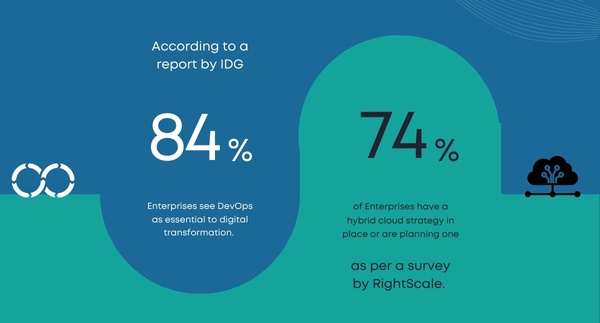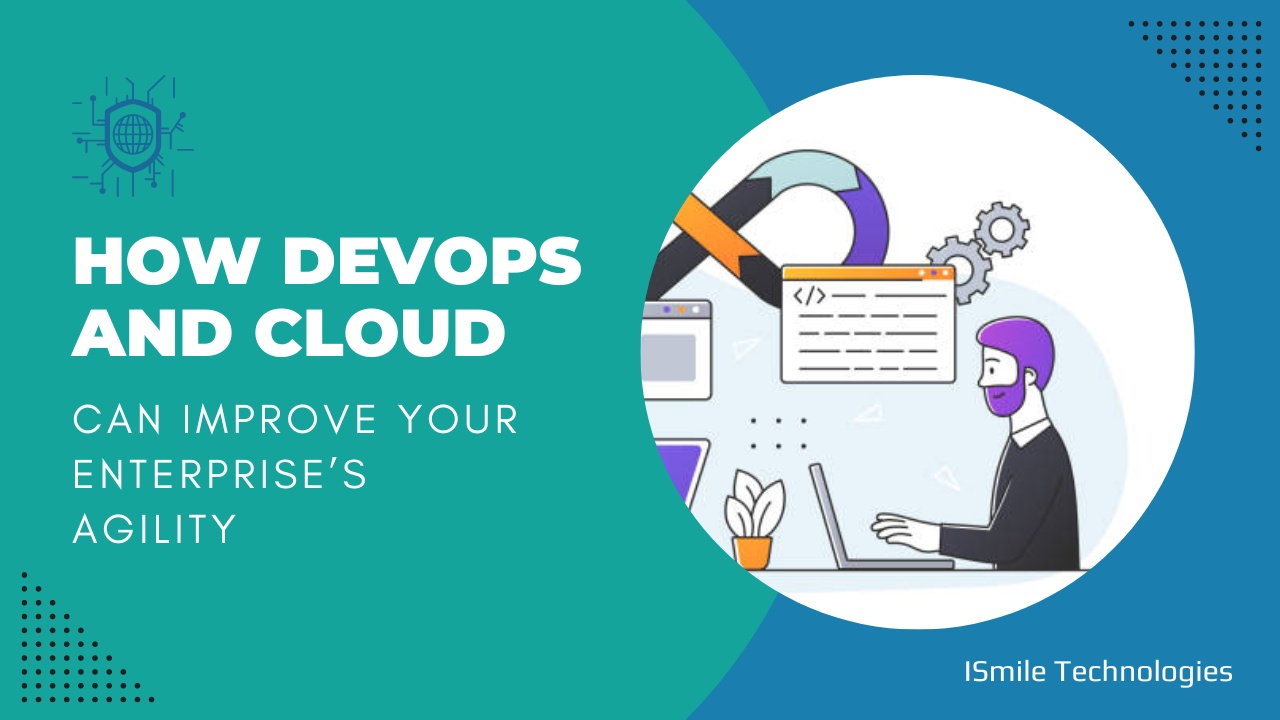Introduction
The modern business environment is fast-paced, complex, and ever-changing, requiring enterprises to be agile and responsive to stay competitive. In this context, enterprise DevOps and cloud technologies have emerged as powerful tools for achieving enterprise agility and driving digital transformation.

By combining DevOps and the cloud, organizations can achieve faster time-to-market, better quality software, increased collaboration, and cost savings.
In this blog, we’ll explore the power of enterprise DevOps and cloud for agile enterprise transformation and how it can help organizations thrive in today’s fast-paced digital economy.
Table of Contents
The Role of DevOps in Enterprise Agility
DevOps has become a buzzword in the software development industry, but its significance goes beyond just hype. It is an essential practice for achieving enterprise agility, which refers to an organization’s ability to respond quickly to market changes, customer needs, and emerging technologies.
Yes, it is true that “DevOps” has become a buzzword in the software development industry. Enterprise DevOps is a methodology that emphasizes collaboration and communication between software developers and IT operations teams.
It has gained popularity in recent years as more organizations have adopted agile development methodologies and moved towards cloud-based infrastructures.
As with any buzzword, there is often a lot of hype surrounding DevOps, and some organizations may use the term without fully understanding what it entails. This can lead to confusion and miscommunication, and in some cases, may even hinder the adoption of DevOps practices.
It is important to note that despite the buzzword status, enterprise DevOps is a legitimate methodology that has been proven to improve software development processes and increase efficiency. When implemented correctly, it can help organizations deliver high-quality software faster and with fewer errors.
So, while it is true that enterprise DevOps has become a buzzword, it is important to focus on the underlying principles and practices that make it a valuable methodology, rather than getting caught up in the hype.
To put things precisely, read ahead and take a closer look at the role of DevOps in enterprise agility:
Faster Time-to-Market
Enterprise DevOps enables faster software delivery by dismantling silos between development, operations, and quality assurance teams.
According to a report by Puppet, high-performing DevOps organizations deploy code 46 times more frequently, with a lead time of 440 times faster than low performers.
Improved Quality
Enterprise DevOps fosters a culture of collaboration and continuous improvement, resulting in higher quality software.
A study by DORA found that elite DevOps performers have a 7 times lower change failure rate and can recover from incidents 2,604 times faster than low performers.
Better Customer Experience
Enterprise DevOps enables organizations to deliver features and updates quickly, improving customer experience and satisfaction.
According to a survey by CA Technologies, 81% of DevOps adopters reported improved customer experience.
Cost Savings
DevOps can reduce infrastructure costs by automating manual processes, minimizing downtime, and optimizing resource utilization.
A report by IBM found that enterprise DevOps practices can lead to a 50% reduction in development costs and a 70% reduction in infrastructure costs.
At this point, you would have understood the picture on how DevOps contributes to an organization in various ways.
The Role of Cloud in Enterprise Agility
Cloud technology has revolutionized the way organizations manage their IT infrastructure and has become a key enabler of enterprise agility.
Here are some ways in which cloud technology can help organizations become more agile:
- Scalability: Cloud technology enables organizations to scale up or down their IT infrastructure based on changing business needs without incurring the costs and complexities associated with traditional on-premises infrastructure.
- Flexibility: Cloud technology offers a range of deployment options, including public, private, and hybrid clouds, giving organizations the flexibility to choose the right deployment model for their specific needs.
- Agility: Cloud technology enables organizations to spin up new resources and services quickly, allowing them to respond rapidly to market changes and customer needs.
- Cost Savings: Cloud technology can help organizations reduce infrastructure costs by minimizing the need for capital expenditure on hardware and software and by leveraging pay-as-you-go pricing models.
- Collaboration: Cloud technology enables distributed teams to work together seamlessly, improving collaboration and productivity.
By embracing cloud technology, organizations can transform their IT infrastructure and become more responsive to changing market conditions and customer needs.
How Enterprise DevOps and Cloud Work Together to Improve Enterprise Agility
DevOps and cloud technology are complementary and work together to improve enterprise agility. They work together to improve enterprise agility by enabling organizations to develop, test, and deploy software more quickly and efficiently.
Enterprise DevOps provides the cultural and process changes needed to foster collaboration and continuous improvement between development, operations, and quality assurance teams. This results in faster software delivery, improved quality, and better customer experience.
Cloud technology provides the scalability, flexibility, and automation needed to support rapid software development and deployment. Cloud technology enables organizations to easily spin up new resources and services, adjust resource allocation based on changing demand, and reduce infrastructure costs.
By combining enterprise DevOps and cloud technology, organizations can achieve faster time-to-market, better quality software, cost savings, and improved customer experience. This helps organizations stay competitive in today’s fast-paced digital economy.
Ready to automate dev & ops to shorten the SDLC?
Talk to our experts today & see how they can help to fulfill your business objectives.
A real-life example justifying how Enterprise DevOps and Cloud work best together
Let’s take a real-life example of Netflix to understand how DevOps and the cloud work together to improve enterprise agility.
Netflix, a leading global streaming service, relies heavily on cloud technology and enterprise DevOps to stay agile and competitive. Netflix’s IT infrastructure is built on top of Amazon Web Services (AWS), which provides the scalability and flexibility needed to support Netflix’s growing user base.
Netflix’s DevOps team uses a range of tools and practices to enable rapid software development, testing, and deployment. For instance, Netflix’s Spinnaker, an open-source continuous delivery platform, enables automated deployments to multiple cloud providers, making it easier to manage multiple environments at scale. Additionally, Netflix uses Chaos Monkey, a tool that randomly kills instances in production to test its resiliency, improving the quality of its services.

By combining enterprise DevOps and cloud technology, Netflix can rapidly deploy new features and updates to its platform, improving customer experience and satisfaction. For example, Netflix uses a feature called “Auto-Scaling” to automatically adjust the number of resources based on changing demand, ensuring that the service remains available and responsive to users at all times.
To summarize, Netflix’s success story demonstrates how DevOps and cloud technology can work together to improve enterprise agility. By leveraging the scalability, flexibility, and automation of cloud technology and the speed, collaboration, and continuous improvement of DevOps, organizations can transform their IT infrastructure and stay competitive in today’s fast-paced digital economy.
Conclusion
In conclusion, enterprise DevOps and cloud technology can play a critical role in improving enterprise agility. By leveraging both the technologies, organizations can become more responsive, efficient, and competitive, enabling them to thrive in today’s fast-paced digital economy.










